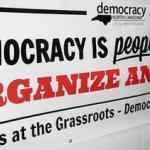Jumpstarting the Vote in North Carolina

In North Carolina, it's called the "Monster Law" -- the 56-page bill passed by the General Assembly and signed by Gov. Pat McCrory (R) last year that ushered in some of the most stringent voting restrictions in the nation.
Among the wide-ranging law's provisions were a strict photo ID requirement, cutting a week from early voting, and ending same-day registration during the early voting period. At the same time, the bill increased contribution limits, decreased election spending disclosure and axed the state's popular "clean elections" programs for judicial and other state races. The effect, in the words of election watchdogs Democracy North Carolina: "More Money, Less Voting."
North Carolina was swiftly taken to court by plaintiffs including the N.C. NAACP, the League of Women Voters and the U.S. Department of Justice, who all argue that the law will have a discriminatory impact on African-American, Latino and Democratic voters. But with a U.S. District Court judge setting the court date for July 2015, what will happen in this year's pivotal elections in North Carolina?
Enter Project Jumpstart, a statewide project unveiled by Democracy North Carolina and allies this month. While a range of groups continue to challenge the vote-suppressing bill, Jumpstart aims to "actively engage people in getting out to vote," said project director Ron Garcia-Fogarty.
Partnering with churches, nonprofits, community groups and others, Democracy North Carolina's team is fanning out across the state to educate and inform voters who may be affected by recent voting changes, and giving them tools to make sure they aren't denied a voice at the polls.
"North Carolina went from 38th in the country in voter turnout to 12th," in part due to reforms that expanded voting access, said Garcia-Fogarty. "These new laws want to take us back."
A big part of Operation Jumpstart will be dispelling confusion about the state's new rules. For example, although the new law now requires election workers to ask for a photo ID at the polls, in 2014 you still can't be denied a ballot if you don't have an ID -- a provision which may confuse and discourage voters.
Voters may also be unclear about what kinds of photo ID are required. A N.C. driver's license or learner's permit, passport and military ID are among those accepted; a student ID or expired license are not.
A Daunting Challenge
The number of North Carolina voters affected by the new election rules -- and who could benefit from Jumpstart's assistance -- is daunting. According to Bob Hall at Democracy North Carolina, the state's own records showed 318,000 registered voters don't have a DMV-issued photo ID. More than half of state voters used early voting in 2008 and 2012, including more than 70 percent of African-American voters.
The demographics of those who will be affected most has been well-documented: African-Americans, Latinos, women and low-income voters. The decision by N.C. lawmakers to reject student IDs for voting points to a constituency that will face especially big obstacles in 2014: the state's surging youth vote.
The Republican-led legislature ended a popular program that pre-registered 16- and 17-year-olds and eliminated a Citizens Awareness Month and annual registration drives at high schools. As Hall notes, the legislature's dismantling of same-day registration during early voting -- disproportionately used by African-American and Latino voters -- will also uniquely impact younger citizens. "Youth were 12 percent of voters but made up 33 percent of those using same-day registration," he says.
Compounding the problem, N.C. lawmakers allocated few resources to educate voters about the new laws, and cash-strapped counties have little capacity to expand their outreach programs.
'A Grassroots Movement'
To fill this void, Jumpstart plans to carry out a thousand "projects" across the state by Election Day: trainings, forums and other outreach to people and groups needing help to navigate North Carolina's bewildering -- and potentially intimidating -- new electoral landscape.
The operation also wants to help grassroots leaders take a proactive role in how their local elections are run. With the shorterning of early voting days, for example, local election boards are tasked with creating new early voting schedules -- plans which have to receive unanimous approval. Democracy North Carolina is helping local leaders ensure that plans make early voting accessible and inclusive.
By creating and strengthening partnerships across the state and developing the leadership of local leaders, the project leaders say they aim to lay the groundwork for a grassroots movement that can have lasting influence beyond the November elections.
"People are intimidated by the process," said Garcia-Fogerty. "We want to empower people, get them working together, help them see themselves as leaders who feel they are part of a social justice movement."
